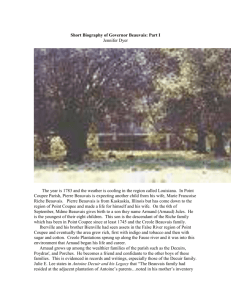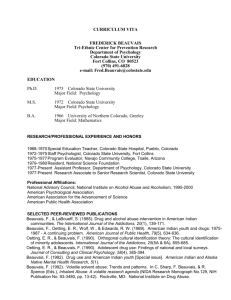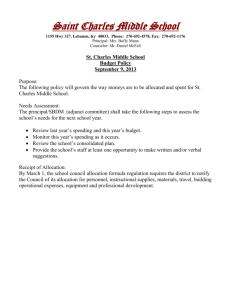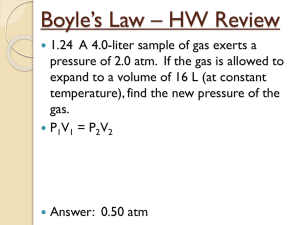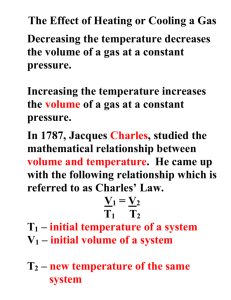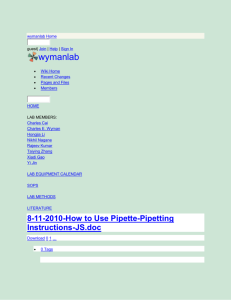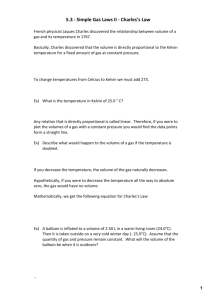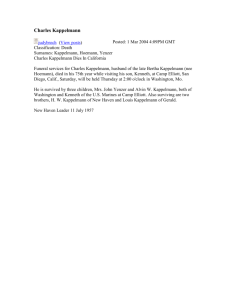GUIDE TO THE CHARLES FREDERICK BEAUVAIS ARCHIVE (97
advertisement
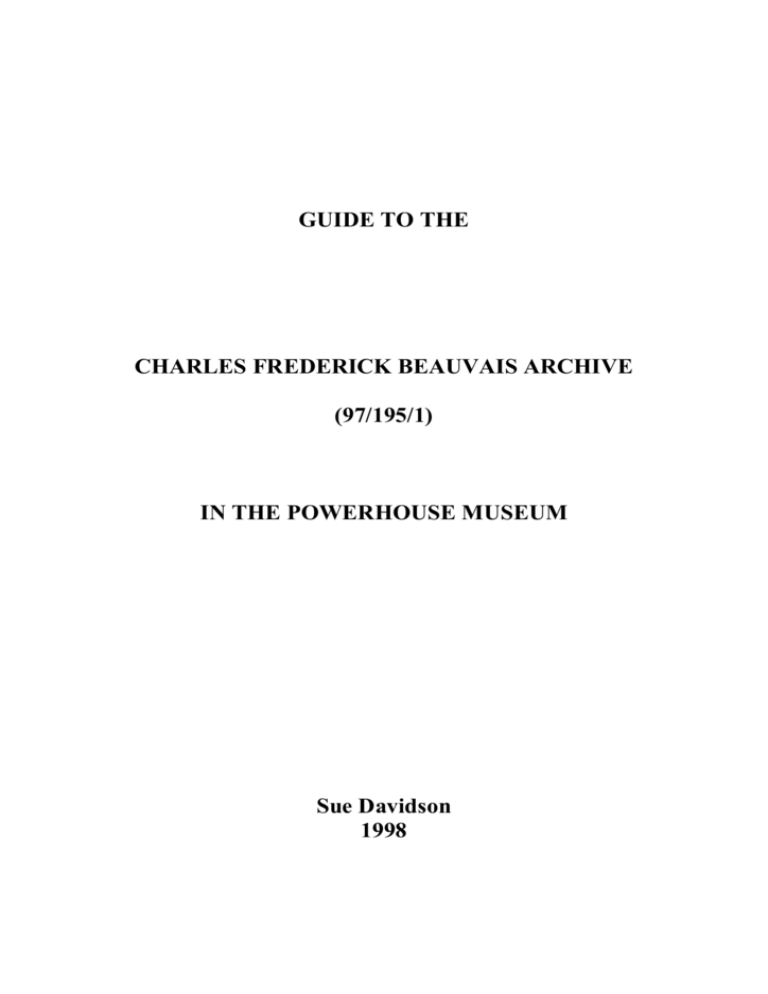
GUIDE TO THE CHARLES FREDERICK BEAUVAIS ARCHIVE (97/195/1) IN THE POWERHOUSE MUSEUM Sue Davidson 1998 CONTENTS Biographical Note Series List Series Descriptions and Item Lists COLLECTED ARCHIVES BIOGRAPHICAL NOTE Registration Number: 98/44/1 Creator: Beauvais, Charles Frederick Charles Frederick Beauvais was an industrial designer, artist and futurist whose main area of interest was automobile design and transport systems. Beauvais worked in England in the 1920s and 1930s, before emigrating to Australia in 1937. Between 1925 and 1929 he worked as Technical Art Editor at The Motor magazine. He worked on the layout of the magazine and also contributed illustrations and occasional articles. Between 1929 and 1934 he worked as an artist-engineer or designer for a number of motor manufacturers. He worked for The Star Motor Co in Wolverhampton, Singer & Co Ltd Coventry, The New Avon Body Company Warwick where he designed and produced twelve new models, and Crossley Motors limited, for whom he designed the new Crossley "Regis". He continued to contribute articles and illustrations to journals and also designed cars for himself. During the 1930s he developed his concept for "The Car of the Future". In 1936 he built a wooden scale model of his design and had an article published in The Motor titled "Rear-Engined Car Possibilities". His design placed the engine at the back and a luggage compartment in the bonnet. The body had a streamlined contour to it. Beauvais believed these features would improve the fuel economy, speed and comfort of the vehicle. In 1937, Beauvais arrived in Melbourne. he contributed an article on traffic conditions in Melbourne to the English journal The Autocar soon after his arrival, titled 'Motoring Down Under'. From about 1938 to 1940 Beauvais worked for the Special Body Division of General Motors Holden designing customised vehicles. He designed streamlined motor coaches, limousines, caravans and commercial vehicles. When the war began he designed jigs and tools for wartime aircraft production. He was then employed as an artist by The Argus newspaper for five years. He drew numerous war illustrations for the newspaper, depicting both the home war effort and the deeds of Australians in battles overseas. He also contributed his futurist drawings to the newspaper and a number of articles. One such article was "The Post War Car", which was published in 1946. This was an article about Beauvais' Car of the Future. The archive contains a number of the original drawings which were used in this article. Another example is the article "Atomic Age, Artist Foresees New Transport Methods". He moved to Sydney in about 1946 and established his own Industrial Design company called Industrial Styling Company - Australasia. The company created a diverse range of products including exhibition displays, oil stoves, and lamps. In 1947 Beauvais created a nodel of the City of the Future for Atlantic Union Oil Company. The model was displayed at the Sydney Royal Easter Show and the Melbourne Show. It was approximately twenty feet long and made from plastic. There were 2000 plastic vehicles which moved around ten lane highways on rubber conveyer belts. In 1954 Beauvais' company designed and constructed two of the arches over Sydney roadways which were erected for the Royal Visit. Industrial Styling built an arch over Park Street for Sydney City Council which was shaped as two boomerangs. The materials were supplied by Ralph Symonds Pty Ltd. The company also built an arch in Bridge Street for the Sydney Wool Selling Brokers Association. Charles Frederick Beauvais' son, Peter Beauvais, seems to have been involved in the Industrial Styling Company from its beginning. He was active in the design community and contributed a number of articles to various magazines and newspapers on industrial design. He took over the company in about 1950. At this time the company was incorporated as a new company known as Beauvais Associates. The activities of the organisation were then subdivided between the two companies, with Beauvais Associates concentrating on industrial product design and the International Styling Company manufacturing Beauvais products and producing store modernisation schemes, exhibitions and displays. In 1953 the company moved from Pitt Street to Chippendale and in 1960 to new premises in Revesby. Registration Number: 98/44/1 Creator: Beauvais, Charles Frederick Ron Harrison became Director in the 1960s and remained in charge until 1988, when his son took over. Today the company is still in operation and is known as Beauvais Displays. Charles Frederick Beauvais based his design principles on the ideas of designers such as Norman Bel Geddes and Raymond Leowy. He claimed to be a "designer capable of reshaping things into forms attractive to the eye without transgressing mechanical laws or upsetting practical requirements" (see 98/44/1-6/4). COLLECTED ARCHIVES SERIES LIST Creator: Beauvais, Charles Frederick Reg. Number Series Title Date 97/195/1-1 Design drawings and original artworks 1930-1960 97/195/1-2 Photographs 1930-1960 97/195/1-3 Scrapbook and newspaper clippings 1920-1951 97/195/1-4 Miscellaneous Papers 1935-1956 COLLECTED ARCHIVES SERIES DESCRIPTION Registration Number: 97/195/1-1 Creators: Beauvais, Charles Frederick Series Title: Design drawings and original artworks Date Range: 1930-1960 Physical Characteristics: Pencil drawings, diazo prints and gouache paintings on board. Description: Design drawings/Artworks (27), industrial designs, Charles Beauvais, England/Sydney, 1930-1960 This series contains design drawings and artwork created by Charles Frederick Beauvais. Fifteen of the designs are motor vehicles designed for General Motors Holden Limited in Melbourne. Upon his arrival in Melbourne in 1937, Beauvais worked for the Special Body Division of General Motors Holden, designing customised vehicles. He designed streamlined motor coaches, limousines and commercial vehicles. When the War began he designed jigs and tools for wartime aircraft production. Beauvais then worked as an artist for The Argus newspaper. He created a number of war illustrations, as well as having his futuristic designs published. This series contains original artwork for illustrations that appeared in the newspaper. One such drawing depicted a helicopter bus service from Wynyard station and appeared in an article titled 'Atomic Age, Artist forsees New Transport Methods'. In the mid 1940s Beauvais moved to Sydney and established his industrial design company 'Industrial Styling Company Australasia'. Some of the drawings date from this time, and are stamped with the company stamp. Others were done by Beauvais in England, before he came to Australia. Beauvais appears to have reused and further developed many of his English ideas once he was in Australia. Whilst most of the designs are for motor vehicles, which was Beauvais main area of interest, the two drawings of the ice bucket indicate that the Industrial Styling Company created a broad range of products. Also included in this series are two drawings of the Beauvais 'Car of the Future'. The first is a pencil drawing dating from 1934 which appeared in an article in The Motor in 1936, the other is a painting dated 1945, which appeared in the Argus Weekend Magazine in an article by Beauvais titled 'The Post War Car'. The drawings are similar in that the engine for the car is at the rear and both feature the streamlined body. Arrangement: Dimensions: Shelf Length 0.500 m Box Number: F1 & F2 COLLECTED ARCHIVES ITEM LIST Series Title: Design drawings and original artworks Item Number Item Title Box 97/195/1-1/1 Design drawing, 130" WB Special Seven Passenger Vauxhall, for Special Body Division, General Motors Holden Limited, paper/pencil, Charles Beauvais, Melbourne, 1938 F1 Rendered drawing of side of car, initialled and dated lower right, written in top right corner "please return to GMH (second design)", drawing numbered 512c. 97/195/1-1/2 Design drawing, Special Body on Renault developed for Crossley-Triumph Distributors, for Special Body Division, General Motors Holden Limited, paper/pencil, Charles Beauvais, Melbourne, 1939 F1 Rendered drawing of side of car, initialled and dated lower right, embossed with Special Motors Division GMH logo upper left, numbered 562. 97/195/1-1/3 Design drawing, diazo print, 'General contour of proposed medium size car drawings - B1234', paper, Charles Beauvais, Melbourne, 1940 F1 Rendered drawing of side of car, initialled and dated lower right. 97/195/1-1/4 Design drawing, diazo print, car design, 'Side elevation exterior dimensions B1', paper, Charles Beauvais, Melbourne, 1940 F1 Technical drawing of side of car, initialled and dated lower right. 97/195/1-1/5 Design drawing, diazo print, car design, 'Side elevation interior dimensions B2', paper, Charles Beauvais, Melbourne, 1940 F1 Technical drawing of side of car, showing the interior, initialled and dated lower right. 97/195/1-1/6 Design drawing, diazo print, car design, 'Plan & Section B3', paper, Charles Beauvais, Melbourne, 1940 F1 Technical drawing, overhead view, one half showing interior, initialled and dated lower right. 97/195/1-1/7 Design drawing, diazo print, car design, 'Cross Section B4', paper, Charles Beauvais, Melbourne, 1940 Technical drawing, two views of rear of car, one showing interior, initialled and dated lower right. F1 Item Number Item Title Box 97/195/1-1/8 Design drawing, diazo print, car design, 'General contour of proposed "coupe utility" - drawings - C.2.3', paper, Charles Beauvais, Melbourne, 1940 F2 Rendered drawing of side view of utility, initialled and dated lower right. 97/195/1-1/9 Design drawing, diazo print, car design, 'coupe utility - interior dimensions C2', paper, Charles Beauvais, Melbourne, 1940 F1 Technical drawing of side of utility showing interior, initialled and dated lower right. 97/195/1-1/10 Design drawing, diazo print, car design, 'Coupe utility - Plan & Section, C3', paper, Charles Beauvais, Melbourne, 1940 F1 Technical view from above, half of drawing showing interior, initialled and dated lower right. 97/195/1-1/11 Design drawing, diazo print, and photographic print, 'Special dual-purpose low-loading four-wheel garbage trailer', paper, Charles Frederick Beauvais, Melbourne, 1940 F1 Rendered drawing of side of trailer, with smaller drawing of back view and drawing showing trailers on tow and tipping action. Embossed with logo of Special Body Division General Motors Holden Limited. With b&w photograph of trailer stapled to front. 97/195/1-1/12 Design drawing, diazo print, 'Garbage trailer', paper, Charles Frederick Beauvais, Melbourne, 1940 F1 Rendered drawings of garbage trailer, side view and front view, logo of Special Body Division of General Motors Holden Limited in upper right corner. 97/195/1-1/13 Design drawing, diazo print, truck design, '"Maple Leaf" 3-4 Ton (single or dual rear wheels)', paper, Charles Frederick Beauvais, Melbourne, 1940 F1 Rendered drawing of side of truck, initialled and dated lower right, stamp of Special Body Division of General Motors Holden Limited appears as a black rectangle in upper left corner. 97/195/1-1/14 Design drawing, diazo print, bus design, 'Bedford 1940 bus chassis with route-bus body 29 passengers', paper, Charles Frederick Beauvais, Melbourne, 1940 Rendered drawing of side of bus, embossed with logo of Special Body Division of General Motors Holden Limited at lower left corner. F1 Item Number Item Title Box 97/195/1-1/15 Design drawing, diazo print, bus design, 'Special forward control "Maple Leaf" (extended chassis) 32 passenger bus', paper, Charles Frederick Beauvais, Melbourne, 1940 F1 Rendered drawing of side of bus, initialled and dated lower right, embossed with logo of Special Body Division of General Motors Holden Limited upper left. 97/195/1-1/16 Artwork, design for milk trolley, board/gouache, Charles Frederick Beauvais, England/Australia, 1930-1945 F2 Embossed 'C F Beauvais "Industrial Stylist" 11 New Court W.C.2 Tel. Holborn 7313' on top left corner. Lower right corner has stamp 'Industrial Styling Company - Australasia'. Board has a cover of tracing paper. 97/195/1-1/17 Artwork, design for tram, board/gouache/pencil, Charles Frederick Beauvais, Australia, 1940-1960 F2 Front view of tram, stamped 'Industrial styling Company Australasia' on top left corner. Board has a cover of paper. 97/195/1-1/18 Pencil drawing, 'Aerobus', paper/pencil, Charles Frederick Beauvais, Sydney, 1945 F2 Drawing shows Beauvais' vision of a futuristic Sydney, with an helicopter bus service from Wynyard Station to Sydney suburbs. The Aerobus flying in the centre of the drawing has a sign 'Mosman' on the front. This image appeared in Pix Magazine, 15 December 1945, as part of an article titled 'Atomic Age, Artist forsees New Transport Methods'. 97/195/1-1/19 Pencil drawing, chassis and engine of a car, paper, Charles Frederick Beauvais, England/Australia, 1930-1960 F2 97/195/1-1/20 Pencil drawing, rear engined streamlined saloon car, paper, Charles Frederick Beauvais, England, 1934 F2 Rendered drawing of side of car, designed by Beauvais to have the engine at the back. Embossed 'C.F.Beauvais "Industrial Stylist"' at left top corner, signed lower right. 97/195/1-1/21 Artwork, car of the future, paper, Charles Frederick Beauvais, Sydney, 1945 F2 Printed photograph of car stuck onto gouache painted board, dated 27/1/45 in pencil. 97/195/1-1/22 Design drawing, ice bucket, paper/pencil, Charles Frederick Beauvais, England/Australia, 1930-1960 Two drawings of an ice bucket, one coloured blue. F2 Item Number Item Title Box 97/195/1-1/23 Design drawing, ice bucket, paper/pencil, Charles Frederick Beauvais, England/Australia, 1930-1960 F2 Two technical drawings of an ice bucket, one side view and one top view. 97/195/1-1/24 Drawings, cars, paper/board, Charles Frederick Beauvais, 1945 F2 Nine pen and gouache drawings of the development of the car from 1890 to Beauvais's vision for the car of 1950. Each drawing is on paper, which has been pasted onto board (drawing No. 5 missing). The board is torn into 2 pieces. Written in pencil at top right of the board is 'Sketches for article on Post War Car', and it is initialled lower right. Drawings appeared in the article 'The Post War Car' in the Argus Weekend Magazine on 27 January 1945. 97/195/1-1/24/1 Drawings, cars, paper/board, Charles Frederick Beauvais, 1945 F2 One half of board which has been torn in two pieces. Four pen and gouache drawings of the development of the car from 1890 to 1910. Each drawing on paper which has been pasted onto board (drawing No. 5 missing). Drawings appeared in the article 'The Post War Car' in the Argus Weekend Magazine on 27 January 1945. 97/195/1-1/24/2 Drawings, cars, paper/board, Charles Frederick Beauvais, 1945 F2 One half of board which has been torn in two pieces. Five pen and gouache drawings of the development of the car from 1930 to 1950. Each drawing on paper which has been pasted onto board. Drawings appeared in the article 'The Post War Car' in the Argus Weekend Magazine on 27 January 1945. 97/195/1-1/25 Artwork, 'The Post War Car', board/gouache/pencil, Charles Frederick Beauvais, Sydney, 1945 F2 Artwork of the car of the future painted by Beauvais to be used in his article 'The Post War Car' in the Argus Weekend Magazine, 27 January 1945. Beauvais described his car of the future as the 'All-Australian Car'. His design placed the engine at the back and the streamlined contour of the body would enhance fuel economy, speed and comfort. 97/195/1-1/26 Painting, futuristic battleship, board/gouache, Charles Frederick Beauvais, Sydney, 1945 Battleship designed by Beauvais which carries planes, boats and submarines. Appeared in the Argus Newspaper in an article titled "An artist's dream of a future warship". F2 Item Number Item Title 97/195/1-1/27 Design drawing, print, Super Tram, board/wood, Charles Frederick Beauvais, Australia, c1945 Beauvais' design for a futuristic 'Super Tram for Express Track', stamped with 'Industrial Styling Company Australasia', signed lower right, framed in a wooden frame. Box COLLECTED ARCHIVES SERIES DESCRIPTION Registration Number: 97/195/1-2 Creators: Beauvais, Charles Frederick Series Title: Photographs Date Range: 1930-1960 Physical Characteristics: Black and white photographic prints Description: Photographic prints (11), b&w, Charles Beauvais, Australia, 1930-1960 This series contains photographs of Charles Beauvais and his work. It includes two photos of Beauvais with his model of the 'Car of the Future'. There is also a photograph of Beauvais working on the design of a miniature saloon Singer. There are four photographs of the exhibition Beauvais designed titled 'City of the Future'. This large model of a futuristic city was designed for Atlantic Union Oil and exhibited at the Royal Agricultural Show in Sydney, in April 1947, as well as in Melbourne. The series also contains one photograph of the arches over Park Street that Beauvais designed for the Royal visit of 1954. Arrangement: Dimensions: Shelf Length Box Number: 1 0.010 m COLLECTED ARCHIVES ITEM LIST Series Title: Photographs Item Number Item Title Box 97/195/1-2/1 Photographic print, b&w, Atlantic Union Oil 'City of the Future' exhibition at Royal Agricultural Show, paper, designed Charles Frederick Beauvais, photograph Russell Roberts, Sydney, New South Wales, Australia, 1947 1 Shows crowd viewing the model of the city of the future designed by Beauvais. Photograph is stamped "A Russell Roberts Picture" on the back. 97/195/1-2/2 Photographic print, b&w, Atlantic Union Oil 'City of the Future' exhibition at Royal Agricultural Show, paper, designed Charles Frederick Beauvais, photograph Russell Roberts, Sydney, New South Wales, Australia, 1947 1 Shot of the model designed by Beauvais of the 'City of the Future' with Atlantic Union Oil sign. Stamped on back "A Russell Roberts Picture". 97/195/1-2/3 Photographic print, black & white, Atlantic Union Oil 'City of the Future' exhibition at Royal Agricultural Show, paper, designed by Charles Frederick Beauvais, photographed by Max Dupain, Sydney, New South Wales, Australia, 1947 1 Shot of the 'City of the Future' model, stamped on back "Max Dupain, 49 Clarence St Sydney" also stamped "Industrial Styling Company - Australasia". 97/195/1-2/4 Photographic print, black & white, Atlantic Union Oil 'City of the Future' exhibition at Royal Agricultural Show, paper, designed by Charles Frederick Beauvais, photographed by Max Dupain, Sydney, New South Wales, Australia, 1947 1 Photograph of the 'City of the Future' model, which was designed by Charles Frederick stamped on back "Max Dupain, 49 Clarence St Sydney" also stamped "Industrial Styling Company - Australasia" with "Designed and built by Industrial Styling Co Australasia" written in pencil. 97/195/1-2/5 Photographic print, b&w, Charles Frederick Beauvais designing miniature saloon Singer, paper, Photopress, England, 1931 1 Shows Beauvais drawing up plans for the Singer car, appeared in the Sunday Dispatch newspaper, 8 February 1931. 97/195/1-2/6 Photographic print, b&w, Charles Frederick Beauvais with his model for the 'Car of the Future', paper, England/Australia, 1930-1945 1 Item Number Item Title Box 97/195/1-2/7 Photographic print, b&w, Charles Frederick Beauvais with his model for the 'Car of the Future', paper, England/Australia, 1930-1945 1 97/195/1-2/8 Photographic print, b&w, card sent to Charles Frederick Beauvais, paper, Sydney, 1945 1 From Arnold Beauvais in Surrey, England. Picture of a cherub holding luggage, contains the message 'Best wishes for 1945, To you both from Arnold'. 97/195/1-2/9 Photographic print, b&w, model of Charles Frederick Beauvais's design of a tram, paper, Visatone, Sydney, 1940-1960 1 97/195/1-2/10 Photographic print, b&w, 'Atomic Age' the city of the future, Charles Frederick Beauvais, Sydney 1945-1960 1 Later photograph of a drawing by Beauvais of Sydney of the future, with the sky filled with helicopter 'Aerobuses'. Similar to drawings by Beauvais that appeared in Pix Magazine, 15 December 1945, in the article 'Atomic Age, Artist forsees New Transport Methods'. 97/195/1-2/11 Photographic prints, b&w, construction of Royal visit arches over Park Street by Charles Frederick Beauvais, Peter Lovas, 1954 Beauvais's design of two arches shaped as boomerangs was chosen by Sydney City Council to decorate Park Street for the Royal Visit. The boomerangs were painted with aboriginal style motifs and the Royal Crest was hung from the centre. 1 COLLECTED ARCHIVES SERIES DESCRIPTION Registration Number: 97/195/1-3 Creators: Beauvais, Charles Frederick Series Title: Scrapbook and newspaper clippings Date Range: 1920-1951 Physical Characteristics: Scrapbook with cardboard pages and newspaper clippings pasted in, and loose newspaper and magazine clippings. Description: Scrapbook and newspaper clippings (10), car designs and illustrations, paper, Charles Frederick Beauvais, England/Australia, 1920-1951 Charles Beauvais worked as an Industrial Designer and also as an illustrator for newspaper and magazines. The scrapbook contains illustrations by Beauvais for the English 'The Motor' newspaper, where he was employed as the Technical Art Editor between 1925 and 1929. In Australia, Beauvais worked as an artist for 'The Argus'. He contributed drawings, illustrations and also articles to the newspaper, and during the war he worked as a war artist for the newspaper. He also contributed to other Australian newspapers including the 'Sydney Morning Herald' and 'The Australasian'. The newspaper clippings in this series are from English and Australian newspaper or magazines and include articles about cars designed by Beauvais in the 1920s, as well as articles written and/or illustrated by him. These include an early article on Beauvais' 'Car of the Future' which appeared in 'The Motor' as well as a 1945 article on the 'Post War Car' in the Argus. There are also articles by Beauvais on the importance of industrial design. The archive includes some of the original drawings by Beauvais which appear in these newspaper clippings. Arrangement: Chronological Dimensions: Shelf Length Box Number: 1 0.010 m COLLECTED ARCHIVES ITEM LIST Series Title: Scrapbook and newspaper clippings Item Number Item Title Box 97/195/1-3/1 Scapbook, paper, Charles Frederick Beauvais, England, 1925-1929 1 This cardboard paged scrapbook is missing its cover and possibly some pages. It contains newspaper clippings of illustrations and cartoons by Beauvais for 'The Motor'. Between 1925 and 1929 Beauvais worked as the Technical Art Editor for 'The Motor', he contributed mechanical illustrations, drawings, cartoons and also articles to the newspaper. 97/195/1-3/2 Newspaper clipping, reprint from 'The light Car and Cyclecar', paper, Charles Frederick Beauvais, 29 May 1920 1 Article titled "The C.F.B. Friction and Belt-driven Cyclecar" about a cycle car designed by Beauvais. 97/195/1-3/3 Newspaper clipping, 'The Motor Cycle', paper, Charles Frederick Beauvais, England, 1922 1 Article titled "A Four-wheeler on Motor Cycle Lines", about a cycle car designed by Beauvais. 97/195/1-3/4 Newspaper clipping, The Auto Motor Journal, paper, Charles Frederick Beauvais, England, 13 July 1922 1 Article titled 'The Bow "V" Car' about a car designed by Beauvais. 97/195/1-3/5 Magazine clipping, reprint from 'Industrial World', paper, Charles Frederick Beauvais, England, July 1933 1 Article titled 'Fashion Cars of the Future' refers to Beauvais as the artist-engineer at the New Avon Body Company. 97/195/1-3/6 Newspaper clipping, The Motor, paper, Charles Frederick Beauvais, England, 14 July 1936 1 Article titled 'Rear-Engined Car Possibilities' about Beauvais design for a rear engined car, the 'Car of the Future' contains Beauvais drawing of the car and photograph of the model. 97/195/1-3/7 Magazine clipping, The Australasian, paper, Charles Frederick Beauvais, Australia, 28 November 1942 Drawing of a shipwright, "The Riveter", by Beauvais. 1 Item Number Item Title Box 97/195/1-3/8 Magazine clipping, The Australasian, paper, Charles Frederick Beauvais, Australia, 12 August 1944 1 Article titled 'Britain will offer us these' about British industrial design, with illustrations by Beauvais. 97/195/1-3/9 Newspaper clipping, The Argus Weekend Magazine, paper, Charles Frederick Beauvais, 27 January 1945 1 Article titled 'The Post War Car, A suggestion for a properly planned Australian vehicle of the future', written and illustrated by Beauvais about his Car of the Future. 97/195/1-3/10 Magazine clipping, reprint from Rydge's, paper, Charles Frederick Beauvais, Australia, 1 February 1946 1 Article titled 'Outstripping Competitors' about industrial design, written and illustrated by Beauvais. 97/195/1-3/11 Newspaper clipping, 'The Sydney Morning Herald Magazine', paper, Charles Frederick Beauvais, Sydney, 9 July 1946 1 Article titled 'Looking at life in outer space' on the telescope at Mount Palomar, California, illustrated by Beauvais. 97/195/1-3/12 Magazine, 'Sydney Suburbs From The Air', a free supplement with the Sunday Herald, paper, Charles Frederick Beauvais, Sydney, 11 June 1950 1 Contains photographs of Sydney, was kept by Beauvais but does not appear to contain his work. 97/195/1-3/13 Magazine clipping, 'Building and Engineering', paper, Peter Beauvais, Australia, 24 September 1951 Article titled 'Industrial Design' by Peter Beauvais (son of Charles Frederick). 1 COLLECTED ARCHIVES SERIES DESCRIPTION Registration Number: 97/195/1-4 Creators: Beauvais, Charles Frederick Series Title: Miscellaneous Papers Date Range: 1935-1956 Physical Characteristics: Printed and typescript papers. Description: Documents (7), paper, Charles Frederick Beauvais, England/Australia, 1935-1956 This series contains miscellaneous papers relating to Charles Frederick Beauvais' career. It includes advertisements for the Crossley Regis Saloon car that Beauvais designed in England, and a pamphlet advertising the Special Dody Division General Motors Holden, where Beauvais worked between 1938 and 1940. There is also Beauvais' notes on the design of a Funnel Bus, a typescript copy of a talk he gave on road safety in 1956 and the Annual Report of the Veteran Motorists of Australia Association for 1956. Arrangement: Chronological Dimensions: Shelf Length Box Number: 1 0.010 m COLLECTED ARCHIVES ITEM LIST Series Title: Miscellaneous Papers Item Number Item Title Box 97/195/1-4/1 Advertisements, (3), for Crossley Regis Saloon car and Lagonda car, paper, Charles Frederick Beauvais, England, 1935 1 On three pages stapled together. Beauvais designed the Crossley Regis Saloon. 97/195/1-4/2 Pamphlet, 'The Special Body Division General Motors-Holden's Ltd. Manufacturers of Custom-built Bodies', paper, Charles Frederick Beauvais, Melbourne, 1930s 1 Contains b&w photograph of a mobile draper's shop. 97/195/1-4/3 Documents, notes on the Funnel Bus, paper, Charles Frederick Beauvais, Australia, 1939 1 For General Motors Holden Ltd. 97/195/1-4/4 Document, typescript copy of talk on road safety, paper, Charles Frederick Beauvais, Sydney, 1956 1 Titled 'A Talk on Road Safety and a Method of Preventing Accidents'. 97/195/1-4/5 Document, Annual Report of The Veteran Motorists of Australia Association, paper, Charles Frederick Beauvais, Sydney, 1956 1
